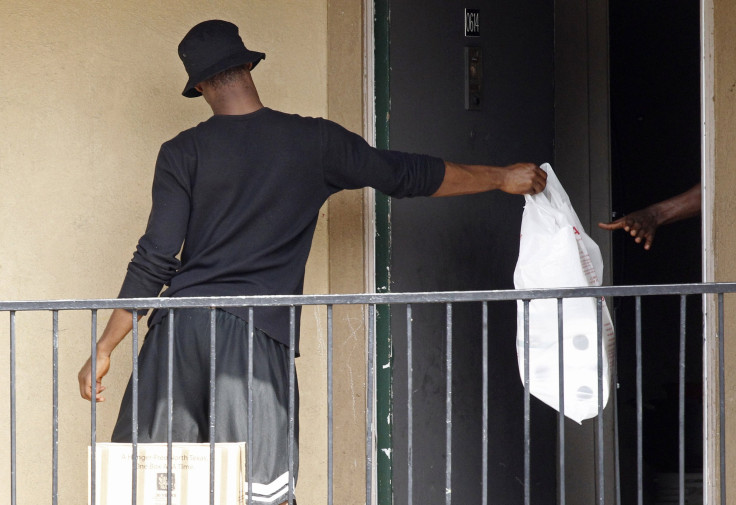Texas apartment where U.S. Ebola patient stayed to be cleaned: official

(Reuters) - U.S. health officials on Friday said Dallas authorities planned to properly dispose of items in the apartment where the first person diagnosed with Ebola in the country had stayed and where four people close to him are quarantined.
"This is something we expect to get resolved today," said Dr. Thomas Frieden, director of the U.S. Centers for Disease Control and Prevention, when asked about a delay in cordoning off and cleaning the site.
In an interview with NBC's "Today" show, Frieden said bleach was being used to clean the residence and that Dallas authorities were working closely with the CDC.
Sheets and other items used by the man have been sealed in plastic bags, but questions have been raised about the delay since the patient's diagnosis was confirmed Sunday.
U.S. health officials have expressed confidence that they could prevent the spread of Ebola in the United States after the first case was diagnosed there this week. The virus has killed more than 3,300 people in the current outbreak in West Africa.
On Thursday, NBC News said one of its freelance cameramen had contracted Ebola, the fifth American to be diagnosed. The network identified the staffer as Ashoka Mukpo, 33.
NBC said he had quarantined himself after feeling ill and discovering he had a fever. He was expected to undergo treatment in the United States.
"He is scared and worried," his father, Dr. Mitchell Levy, told NBC on Friday, adding that "his spirits are better today."
Dr. Nancy Snyderman, the correspondent whose crew included Mukpo, told NBC she suspected he was infected before they met him but that "he should have a very good prognosis."
NBC has said the entire crew would return to the United States on a private plane and remain under quarantine for 21 days, the maximum incubation period for Ebola.
In Dallas, four people close to the Ebola patient, Liberian citizen Thomas Eric Duncan, have been quarantined in the apartment as health officials widened their search for others who had contact with him.
Up to 100 people had direct or indirect contact with Duncan, a handful were being monitored and so far none has shown any symptoms, according to the CDC and Dallas County officials. Ebola, which can cause fever, vomiting and diarrhea, spreads through contact with bodily fluids such as blood or saliva.
Frieden said the CDC would not release the names of those being monitored.
U.S. ON ALERT
Staying there are is a woman who had a child with Duncan, one of her children, age 13, and two visiting nephews in their 20s, she told CNN on Thursday.
Duncan's case has put U.S. health authorities and the public on alert over concerns that the virus could spread from Liberia and two other impoverished West African countries, Guinea and Sierra Leone.
Still, officials have said the U.S. healthcare system is well-prepared to contain the hemorrhagic fever's spread by tracking exposure and employing proper care. President Barack Obama pledged federal support on Thursday in a call to Dallas Mayor Mike Rawlings.
Three Americans contracted Ebola in West Africa, were flown to the United States for treatment and later released: Dr. Kent Brantly, Nancy Writebol and Dr. Rick Sacra. A fourth unnamed American who contracted Ebola in West Africa is being treated at Emory University Hospital in Atlanta.
Duncan remains in serious condition at Texas Health Presbyterian Hospital, a spokeswoman there said on Thursday.
He initially sought treatment at the hospital on Sept. 25 but was sent back to the apartment with antibiotics, despite telling a nurse he had just been in Liberia.
By Sunday, he needed an ambulance to return to the same hospital after vomiting on the ground outside the apartment complex.
According to CNN, the woman who had a child with Duncan said she told hospital staff twice that he had come from Liberia.
Hospital officials on Thursday said Duncan was mistakenly sent home at first because of a software problem that has since been fixed, rather than human error.
In a statement, they said doctors and nurses had followed their protocols but that their computerized records on the patient did not mesh. A nurse's record of the case showed Duncan had come from Liberia, but doctors who examined him may not have had that information in their records.
In Liberia, the head of the country's airport authority, Binyah Kesselly, said the government could prosecute Duncan for denying he had contact with someone who was eventually diagnosed with Ebola.
(Reporting by Susan Heavey and Bill Trott in Washington, Colleen Jenkins in Winston-Salem, North Carolina, Jon Herskovitz in Austin, Lisa Maria Garza and Marice Richter in Dallas and Felix Bate in West Africa; Writing by Susan Heavey and Jim Loney; Editing by Lisa Von Ahn)



























